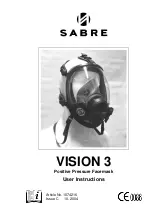
Page 3
For technical questions, please call 1-888-866-5797.
Item 63656
Assembly Instructions
Read the ENTIRE IMPORTANT SAFETY INFORMATION section at the beginning of this document
including all text under subheadings therein before set up or use of this product.
Note:
Because of the unique Flexible
Stand, your Dial Indicator can by mounted to many
different locations for different apllications. When
mounting the Dial Indicator, take into account the
location of the test material, the length of the Dial
Indicator, and the design of the test fixture.
1. Secure pliers to any location.
2. Loosen Caliper Clamp (4) and insert the Dial Caliper
(1) into the opening. See Parts Diagram. Tighten
the knob into place to secure the Dial Caliper.
3. Turn the Cam Lock (5) to lock the cable in place. If
the Cam Lock does not tighten down properly, adjust
the fine-tuning mechanism located near the Dial.
4. Establish a base line. Turn the Bezel on the
Dial so that the needle points to zero.
Note:
There are many applications for the Dial
Indicator with Flex Stand and Clamp. Following
is one example of how the Dial Indicator can
be used: Testing brake rotors for warp.
5. Following Steps 1 through 4, set the Pin of the Dial
lightly against a rotor to establish a base line. You
do not want the needle too tight against the object
being measured. There must be room for the
needle to move in and out while under pressure.
6. Spin the rotor to see if it is true. As the rotor spins,
the needle will move in and out. The dial will
indicate the degrees of difference in true, defined
as the measurements which are above and below
the base line established at the beginning.
Note:
Dial Indicators are highly versatile tools used
in many applications in machine shops and precision
fabricating and testing facilities. The above example is
only one of many possible uses for this measuring tool.
Parts List and Diagram
Part
Description
Qty
1
Dial Caliper
1
2
Locking Cable
1
3
Pliers
1
4
Caliper Clamp
1
5
Cam Lock
1






















